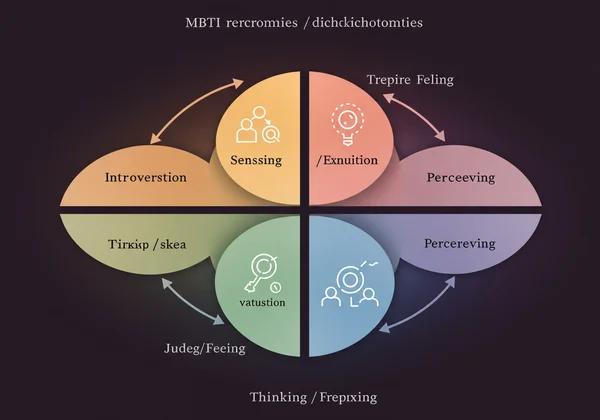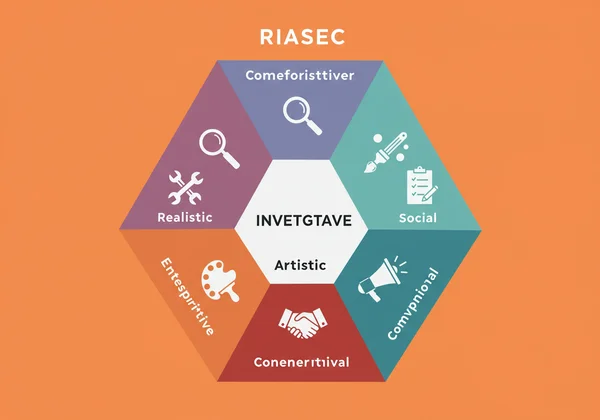MBTI vs. Holland Code: Finding Your Best Career Quiz
Feeling overwhelmed by the sheer number of career tests available online? You're not alone. When you’re trying to find your professional path, choosing the right assessment tool is a critical first step. Two of the most common frameworks you'll encounter are the Myers-Briggs Type Indicator (MBTI) and the Holland Code (RIASEC). But which one is right for you? This guide will break down their differences to help you choose the best career quiz. What is the best career quiz to truly guide your future?
This article dives deep into both models to help you understand their unique strengths and purposes. We'll explore how each test works, what kind of insights they provide, and which one is better suited for actionable career planning. By the end, you'll have the clarity you need to take a meaningful step forward. Ready to explore? You can find your path today with a science-backed assessment.

Understanding the MBTI Personality Test
The MBTI is arguably one of the most well-known personality assessments in the world. Many people have taken a version of it at school or work and find it an interesting tool for self-discovery. It helps you understand your innate preferences and how you perceive the world and make decisions. Let’s look at what it is and how it functions.
What is the Myers-Briggs Type Indicator (MBTI)?
The Myers-Briggs Type Indicator is a self-report questionnaire designed to indicate different psychological preferences. Developed by Isabel Myers and Katharine Briggs during World War II, it is based on Carl Jung's theory of personality types. The MBTI assigns you one of 16 personality types, such as "INFJ" or "ESTP," based on four distinct categories or dichotomies.
These categories are:
- Introversion (I) or Extraversion (E): How you direct and receive your energy.
- Sensing (S) or Intuition (N): How you perceive information.
- Thinking (T) or Feeling (F): How you make decisions.
- Judging (J) or Perceiving (P): How you prefer to live your outer life.
The result is a four-letter code that offers a rich description of your personality.

How MBTI Reveals Personal Preferences
The core strength of the MBTI lies in revealing your personal preferences. It doesn't measure aptitude or skill but rather illuminates your natural inclinations. For example, knowing you're an Introvert (I) can help you understand why you might feel drained after large social events and need time alone to recharge. Similarly, understanding if you lean towards Thinking (T) or Feeling (F) can clarify your decision-making process in relationships and work.
This framework is excellent for improving self-awareness, communication, and team dynamics. It provides a common language for people to discuss their differences in a constructive way. Many find their MBTI type to be an affirming and insightful description of who they are.
Limitations of MBTI for Specific Career Guidance
While the MBTI is a fascinating tool for personal growth, it has significant limitations when used for specific career guidance. Its primary purpose is to describe personality, not to predict job satisfaction or success. The creators themselves cautioned against using it for hiring or selection purposes. The connections it makes between a personality type and specific jobs are often broad and stereotypical.
Furthermore, some critics in the psychology community question its scientific validity, pointing to issues with its binary "either/or" structure and the fact that people can get different results when re-taking the test. For someone seeking concrete, reliable direction for their career, the MBTI may provide interesting food for thought but lacks the direct, actionable link to the world of work that a dedicated career assessment should offer.
Exploring the Holland Code (RIASEC) Model for Career Paths
If the MBTI is about who you are, the Holland Code is about what you like to do. This distinction is crucial for career planning. The Holland Code model, also known as the RIASEC model, is a theory of careers and vocational choice based on personality types that has been widely used and researched for decades in the field of career counseling.
What is Holland Code Theory (RIASEC)?
Developed by psychologist John L. Holland, the Holland Code Theory proposes that people and work environments can be classified into six main types. The theory suggests that people are most satisfied and successful in jobs that match their interests and personality. The six types, often represented as a hexagon, are known by the acronym RIASEC:
- Realistic (R): The "Doers" – practical, hands-on people who enjoy working with tools, machines, or animals.
- Investigative (I): The "Thinkers" – analytical, curious individuals who enjoy solving complex problems.
- Artistic (A): The "Creators" – imaginative, expressive people who thrive in unstructured situations using their creativity.
- Social (S): The "Helpers" – friendly, empathetic individuals who enjoy helping, teaching, and empowering others.
- Enterprising (E): The "Persuaders" – ambitious, energetic leaders who enjoy influencing and leading others.
- Conventional (C): The "Organizers" – detail-oriented, efficient people who enjoy working with data and clear procedures.
Everyone is a combination of these six types, but one, two, or three themes usually stand out. Your specific combination forms your Holland Code.

How RIASEC Identifies Your Ideal Career Fit
The true power of the RIASEC model is how it directly maps your interests to careers. Every job can also be classified using the RIASEC system. For example, a carpenter would be primarily Realistic (R), a scientist would be Investigative (I), and a counselor would be Social (S). A person with a strong "Social-Artistic-Investigative" (SAI) code would likely find fulfillment in a career like counseling psychology, which combines all three elements.
This model provides a clear and direct bridge between your personal interests and potential career paths, helping you identify your ideal career fit with much greater precision than general personality descriptors. If you're wondering "what career suits me?", this model offers a structured answer. You can start the career test to discover your own code.
The Scientific Basis of Holland Code Assessments
Unlike the MBTI, Holland's theory is one of the most respected and empirically supported models in career counseling. It has been the subject of thousands of studies over several decades, demonstrating strong reliability and validity in predicting career choices and job satisfaction. Its focus on interests—a relatively stable aspect of personality—makes it a robust foundation for career exploration. This scientific basis makes it a trustworthy tool for students, job seekers, and career changers who need dependable guidance.
MBTI vs. Holland Code: A Direct Comparison for Career Planning
So, when you’re standing at a career crossroads, which model should you turn to? Let's put them side-by-side. The choice depends entirely on your goal. Are you looking for general self-insight, or are you seeking a concrete career path quiz?
Key Differences in Focus and Purpose
The most significant difference lies in their core purpose.
- MBTI: Focuses on how you think and process the world. Its goal is to increase self-awareness about your internal preferences. It answers the question, "How do I operate?"
- Holland Code: Focuses on your interests and the activities you enjoy. Its goal is to match those interests with compatible work environments. It answers the question, "What work environment will I thrive in?"
Think of it this way: MBTI describes the "operating system" of your mind, while Holland Code identifies the "software applications" you most enjoy using. For career planning, knowing the applications you enjoy is often more direct and useful.
Validity and Reliability for Career Decisions
When it comes to making significant life decisions, scientific backing matters. The Holland Code model is widely considered a more valid and reliable tool for career exploration by vocational psychologists. Its strong empirical foundation provides confidence that the results are stable and meaningful for predicting career satisfaction.
The MBTI, while popular, lacks the same level of scientific consensus for career applications. Its results can be less stable over time, and its categories are not specifically designed to map onto job roles. Therefore, for making an informed career choice, the Holland Code provides a more dependable framework. To get started with a reliable tool, you can take our free quiz.
When to Use Each Test to Explore Your Career Options
Both tools have a place in your self-discovery toolkit.
- Use the MBTI when: You want to understand your communication style, improve teamwork, or gain general insights into your personality and how you relate to others. It’s a great starting point for self-reflection.
- Use the Holland Code when: You need clear, actionable ideas for potential majors, careers, or new job paths. It is the superior choice when your primary goal is to find specific jobs that align with your core interests.
For anyone serious about finding a fulfilling career, a Holland Code assessment is an essential step.
Why We Recommend Holland Codes
At CareerQuiz, our goal is to provide clear, scientific, and personalized career guidance to help you navigate your professional journey with confidence. That is why our free career quiz is built upon the solid foundation of the Holland Code theory. We believe it is the most effective model for helping you discover a career you will love.
Actionable Insights for Your Career Path
We chose the Holland Code because it delivers actionable insights. Instead of just giving you a personality label, our report provides you with your unique RIASEC code and a list of matching career options. These aren't vague suggestions; they are concrete job titles you can research and explore further. Our goal is to empower you with a practical roadmap, not just a theoretical description.

AI-Enhanced Personalization for Deeper Guidance
To make our career test even more powerful, we integrate advanced AI technology. After you receive your Holland Code, you have the option to provide additional background information. Our AI then analyzes this data to generate a deeply personalized report, including your strengths, potential challenges, and a customized action plan. This AI-enhanced personalization goes beyond what a standard assessment can offer, giving you truly tailored guidance.
Free & Comprehensive Career Assessment Options
We believe everyone deserves access to high-quality career guidance. That’s why you can get your report and receive a summary of your results completely free. For those who want to dive deeper, we offer a comprehensive AI-powered report with detailed analysis and strategic recommendations. This flexibility ensures that you can get the help you need, regardless of your budget.
Choose Your Path: Find Your Ideal Career Today
Choosing the right career assessment is about aligning the tool with your goal. While the MBTI offers fascinating insights into your personality, the Holland Code (RIASEC) model provides a scientifically-backed, direct, and actionable framework for career discovery. It connects what you love to do with real-world jobs, giving you the clarity and confidence to move forward.
If you’re ready to stop guessing and start planning, a Holland Code-based career quiz is your best next step. It’s a practical tool designed to illuminate the path that aligns with your true interests. Take the first step toward a more fulfilling professional life. Start your career quiz today and unlock your potential.
Frequently Asked Questions About Career Quizzes
What is the best career quiz?
The best career quiz is one that is scientifically validated, reliable, and provides actionable results. While many quizzes exist, those based on John Holland's RIASEC theory are highly respected in the career counseling field for their proven ability to match personal interests with satisfying career paths. Our test uses this powerful model to provide clear guidance.
Are career quizzes accurate?
The accuracy of a career quiz depends entirely on the theory behind it and the quality of its design. Quizzes based on robust psychological theories like the Holland Codes have demonstrated high levels of accuracy and reliability in predicting career satisfaction. At CareerQuiz, we prioritize a scientific approach to ensure our online career test provides trustworthy insights.
How can a quiz tell me my career?
A well-designed career quiz doesn’t "tell" you your career in a definitive way. Instead, it acts as a powerful guidance tool. By assessing your core interests, values, and aptitudes, it identifies patterns and matches them with careers where people with similar profiles have found success and satisfaction. It narrows down the vast world of jobs to a manageable list of promising options for you to explore.
What career is right for my personality?
Finding a career right for your personality involves matching your interests, work style, and values with a compatible work environment. A Holland Code assessment is excellent for this, as it directly links your interests (a key part of personality) to job types. For example, a "Social" type thrives on interaction, while a "Realistic" type prefers hands-on work. Discovering your unique code is the first step.
Is the quiz free?
Yes, the foundational free career quiz is completely free. You can answer the questions and receive a free summary report that includes your Holland Code and a list of matching career suggestions. For those seeking deeper insights, we also offer an optional, paid AI-enhanced report that provides a comprehensive analysis and personalized action plan.